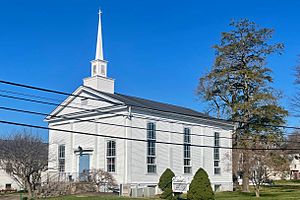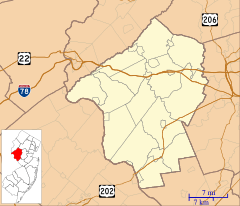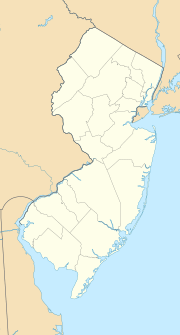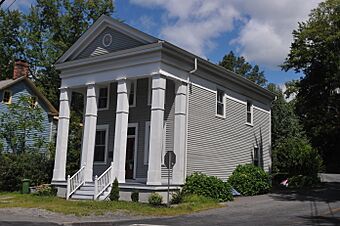Mount Pleasant, Hunterdon County, New Jersey facts for kids
Quick facts for kids
Mount Pleasant, New Jersey
|
|
|---|---|

Alexandria First Presbyterian Church
|
|
| Country | |
| State | |
| County | Hunterdon |
| Township | Alexandria |
| Elevation | 89 m (292 ft) |
| Time zone | UTC−05:00 (Eastern (EST)) |
| • Summer (DST) | UTC−04:00 (EDT) |
| GNIS feature ID | 878576 |
Mount Pleasant is a small community in New Jersey. It's not a town with its own government, but rather an "unincorporated community." This means it's part of larger areas called Alexandria Township and Holland Township. You can find it in Hunterdon County, right along County Route 519.
A special part of Mount Pleasant is its Historic District. This area was officially recognized in 1987 for its important history and buildings.
Contents
Exploring Mount Pleasant's Past
Mount Pleasant has a long history, dating back to the 1700s.
Early Beginnings
- Around 1752, a Presbyterian church was started here. People met in a simple log building for services.
- Before 1790, a school was already open in Mount Pleasant. This shows how important education was to the early settlers.
Life in the 1880s
By the 1880s, Mount Pleasant was a busy little community. It had many things people needed for daily life:
- A post office to send and receive mail.
- Two stores where people could buy supplies.
- A mill, likely for grinding grain.
- A blacksmith, who made and repaired metal tools.
- A tavern, a place for travelers and locals to gather.
Mount Pleasant Historic District
The Mount Pleasant Historic District is a special area that helps preserve the community's past.
What is a Historic District?
A historic district is a section of a town or city that has important old buildings or features. These areas are protected because they tell a story about how people lived long ago. The Mount Pleasant Historic District covers about 59 acres.
Why is it Important?
This district was added to the National Register of Historic Places in 1987. It's important for several reasons:
- Agriculture: It shows how farming shaped the area.
- Architecture: It has examples of old building styles.
- Commerce: It shows how businesses operated.
- Settlement: It helps us understand how the community grew.
- Industry: It gives clues about early local industries.
The district includes 34 buildings that are considered "contributing buildings." This means they add to the historical importance of the area.
Notable Buildings
Two important buildings in the district show older architectural styles:
- The Presbyterian Church, built in 1843, has a simple, traditional style known as vernacular Greek Revival.
- The general store, built in the 1860s, also shows this Greek Revival style.
Images for kids
 | Aaron Henry |
 | T. R. M. Howard |
 | Jesse Jackson |






